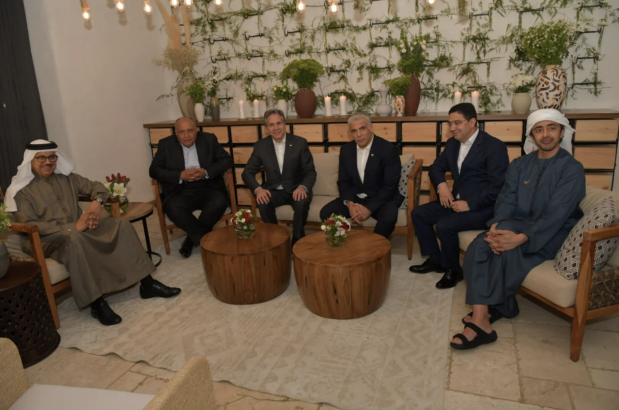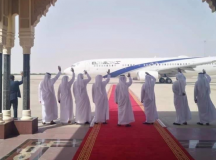Koby Huberman argues the Abraham Accords have made possible a paradigm shift in the way we think of Israeli-Palestinian peace. Leaders must have the courage to seize this opportunity or despair, radicalisation and violence will continue to ruin lives.
On 13 August 2020, within a few hours of the dramatic announcement that Israel and the UAE were about to establish diplomatic relations, I received several phone calls. An Israeli friend congratulated me for the decade-long effort of the Israeli Peace Initiative (IPI) Group to promote a regional approach to peace, and added that ‘now it should be easier to move towards peace with the Palestinians and other Arab states, although the Israeli right-wing Government will not allow that because for them the accords are proof of the bypass approach’. A Palestinian friend rang me later and with a heartbroken voice told me that ‘this was the end of the Palestinian dream to reach a two-state solution, after the betrayal of the UAE.’ That evening, a Saudi friend phoned from the US and said – now it is our turn, and you can move quickly with the Palestinians to bring us on board’.
All three were right and wrong at the same time.
A few months later, the Abraham Accords, now including Bahrain, Morocco and Sudan, became the cornerstone of the new Middle-East diplomatic universe, and reframed the Israeli-Palestinian theatre. The change in the White House in January 2021 with the new Biden Administration, and the new Israeli Coalition Government in the spring, further changed the theatre’s stage, but not the play, the players, or the audience. All remain stuck in their traditional roles.
Israeli perspectives
Most Israelis, left, right and centre, are united in their view that there is still no chance, or no interest, or no need to envisage any movement forward in the peace process given the current leadership of the Palestinian people. Therefore, many – from the centre and pragmatic right and left circles – fell in love with the idea of ‘shrinking the conflict’ – i.e., only taking tactical steps to improve the situation but without any attempt to reach any final status solution.
Many right wingers felt a great sense of victory. After all, in their telling, the Abraham Accords signify a synthetic ‘peace for peace’ deal with no price to be paid to the Palestinians (ignoring the shelving / freezing of Netanyahu’s vow to annex parts of the West Bank). For them, the Accords also represent a smooth deal with no territorial implications at all (as if there were ever territorial disputes with the UAE, Bahrain, Morocco and Sudan that would have required territorial compromise!). Based on this right-wing reading, Israel could now make peace with many more states in the Arab world if only it offered them technology, cooperation and business opportunities. Moreover, the new tourism tsunami that brought 300,000 Israelis to the Gulf, and soon many to Morocco, spread a sense of euphoria. If normalisation was already happening, why bother dealing with the Palestinians?
The Palestinians miss an opportunity
Unfortunately, the Palestinians, as always, refused to see any opportunity in the new developments. The fact that the annexation of parts of the West Bank was successfully thwarted by the Abraham Accords and consequently the two-state option was kept alive, was not greeted with enthusiasm. The Palestinians did not understand the strategic shift in the region or realise that the Arab states now had positive leverage over Israel, which they could have used to encourage and incentivise Israel to make progress towards the Palestinians. Instead, the Palestinian sense of victimhood and of betrayal by the Arab state, a long-term sentiment, was never more obvious or more vocal.
Yet now this sense of betrayal and despair is transcending the ‘borders’ of the Palestinian territories in Gaza and the West Bank. It spills over and connects to extreme elements amongst Israeli Arab citizens, fuelled by dangerous incitement coming from radical circles in the Arab world, both Islamists and pan-Arabists, with Qatari media or Qatari-backed channels as the source. This fusion of despairing sentiments and well-funded radicalisation is leading towards a growing demand for a ‘one-state solution’, from the Jordan River to the Mediterranean Sea. In fact, what we saw both during the May 2021 riots, and in recent weeks, is a perfect example and a ‘promo’ of a one-state scenario – and it demonstrates how terrorists as well as destructive political forces are synchronised in their effort to create chaos between Israelis and Palestinian, as well as inside Israeli society. This threatens to destroy the huge progress achieved over the years in the integration of Israeli Arabs into the fabric of Israeli society.
The Arab states preferred to deprioritise the Palestinian issue
The Arab states, indeed, and particularly those who signed the agreements initially felt that there was no need to address the Israeli Palestinian file due to other priorities: Iran, security concerns, the pandemic, economic challenges, internal political chaos, deeper concerns about climate change and the role of the superpowers in the region, all felt more important. Some of the partners to the Abraham Accords said very clearly that ‘it is time to harvest the fruits of peace first – and that in and of itself would show the Palestinians and others what they could gain if they moved forward and jumped on the train of regional peace’. Just let them watch, the thinking went, and make the right choices.
The international community has lost interest
The international community meanwhile has never been less interested in what’s going on here. I will not waste precious space to explain why the US, Russia, China, the EU and other players are tired of the region in general and the Israeli-Palestinian conflict in particular, nor analyse why they are showing no willingness to yet again get involved in trying to solve the conflict. It looks like most if not all international players realise that at this stage, they cannot drive any significant progress. They therefore prefer not to waste futile efforts that would, quite likely, lead to yet another diplomatic failure. Containing, sitting and waiting has become the de-facto strategy, adopted by most players, albeit due to different and even contradicting motivations. This is a fundamental shift of the traditional diplomatic approach. For decades, regional players were conditioned to wait for yet another American or international effort to move the peace process forward.
A perfect recipe for chaos and violence
If there is one thing that should frighten leaders, policy makers and strategists it is the dissonance between this tangible and very visible euphoria on the one hand and the intangible, hidden, undercurrent of despair on the other. They are developing side by side. This is a perfect recipe for chaos and unexpected violence.
The Palestinian issue is not going to disappear, and it cannot be ignored. At the same time, many facts and factors prohibit the traditional progress forward towards resolving the conflict once and for all. Yet for me, the imminent and unavoidable outcome of neglecting the conflict is a one-state reality, where Israel will lose its Jewish and democratic identity – an outcome that I cannot accept. It is a scenario that involves endless violence and tragedy for all sides.
We can sit and wait until there is a catastrophic eruption of violence (and then everybody will be forced to sit and talk), or expect an effective intervention by the international community (which will force all parties to talk). While the probability of the former is dangerously rising, and the possibility of the latter is diminishing, I suggest we take advantage of the new reality created by the Abraham Accords in order to call for a proactive and hopefully productive paradigm shift. In any event, the parties will ultimately need to talk.
Given the ever-deteriorating reality, innovative approaches are needed more than ever before. If we are to consider a positive transformation of such reality, my working assumption is that progress requires a new collective effort that emerges from the region, rather than from outside it. It has to be reinvented and redesigned based on radical shifts of thinking that generate transformative steps with unprecedented impact. I will endeavour to propose such shifts here and offer some steps, some set to directly address the Israeli-Palestinian road to resolution, while others seek to create a more conducive atmosphere to prepare the groundwork towards diplomatic progress. Here are a few ideas:
1) Harness a new Regional Diplomatic Framework (RDF) – it is time to solidify a new diplomatic framework to discuss and address the Israeli-Palestinian issue, as a regional subject and not just a bilateral one. Egypt, the UAE and Israel should play the major roles, along with Jordan, Morocco, Bahrain and, quietly, Saudi Arabia. These parties need to spend significant time on planning the next steps and aligning their own expectations with their respective geo-strategic interests as well as their respective political constraints.
2) Update timelines and expectations, focus on a new generation – it is not possible to offer a giant leapfrog step towards a final settlement of the Israeli Palestinian conflict. Instead, we should accept that change will happen through new leaders amongst future generations. In light of this, we should use the next 5-10 years to build solid foundations rather than pray for the immediate short-term miracles. To harness and develop that capacity, the RDF should ask the UK and the EU countries to become the catalysts for bottom-up efforts to build leadership, entrepreneurship and invest in the emergence of new talent and leadership circles through education and mentorship.
3) Market the success of the Abraham Accords – we need to see a massive media effort that shows the Palestinians and Israelis concrete examples of success that results from the cooperation developed by the Abraham Accords. The key here is to show and publicly demonstrate so that every Israeli and Palestinian see the benefits of moving towards cooperation and peace.
4) Prevent radicalisation and terrorism – it is not enough to market the success of the Abraham Accords. It is also critical to counter the massive negative propaganda pushed by radical spoilers in the region – whether Islamists or others. The sources of poisonous impact and radicalisation must be followed, attacked and blocked from spreading hatred and incitement. This is also relevant to counter-extremism inside the Palestinian territories and amongst Jewish extremists.
5) Present a new Roadmap as a Regional Peace Initiative (RPI) – rather than waiting for a new American or an international peace initiative, the members of the RDF should agree and start implementing a new RPI, based on the following components:
- Present a Political Horizon – agree on a political horizon for the end-game solution – this horizon could be phrased either specifically (such as ‘two state solution as part of a regional framework’) or in very general terms (‘any agreed solution that gives the Palestinians self-determination and rights’).
- Prevent Irreversibility – agree on the principle that irreversible steps shall be banned by both parties. For example, no expansion of Israeli settlements beyond the current settlement blocs; and no unilateral dissolution of the Palestinian Authority.
- Stabilise Jerusalem – agree on multilateral involvement in stabilising Jerusalem, as an effort primarily led by Israel and Jordan and supported by other regional parties in the RDF.
- Invest in Gaza and West-Bank Development – working through trusted parties and political figures, bring the UAE to Gaza and the West Bank, to offer financial support and balance the sole role Qatar enjoys (in Gaza). Engage Turkey to influence Hamas and help stabilise Gaza, and build an economic development roadmap for Gaza along with Egypt, Turkey and the support of the UAE.
- Rehabilitate one refugee camp at a time – consider a bold move to pick a select group of symbolic refugee camps with terrorist infrastructure, and rebuild them, to show an alternative path.
- Implement Trilateral Reciprocity – offer a scheme of trilateral reciprocal gestures/diplomatic moves/transactional steps taken by some or all of the RDF members towards Israel, to encourage progress between Israel and the Palestinians. The principle would be that visible positive steps by Arab states towards Israel will trigger Israeli gestures towards the Palestinians. The RDF parties should agree on the sequence of diplomatic, commercial and security coordination steps (even if these remain under the table), and reciprocal steps to be taken by Israel and by the Palestinians.
- Develop Palestinian Unity, and Cultivate Transitional and Future Leadership – sadly, we need to acknowledge that current Palestinian leadership will not move politically. Therefore, as a transitional phase, the RDF should help develop a coalition of Palestinian pragmatic leaders from both Fatah, Hamas and Independent parties who will work together to build Palestinian unity, stabilise the situation and ease the political tensions between the different factions. This transitional leadership phase will be ready to reach interim and transitional agreements with Israel, together with Arab involvement in state building and bottom-up improvement. In parallel, it is time to develop and support the next generation of young Palestinian leaders, and work with them to take responsibility for their communities, to build the groundwork for future engagement with Israel to reach transitional and permanent diplomatic agreements.
The above proposals are a break from the traditional peace-making paradigm we have seen try and fail over decades. Typically, pitching such a break is naturally met with skepticism, if not disbelief. Yet recent weeks have brought pictures of regional leaders meeting in Sharm A-Sheikh, Aqaba and the Negev Conference. These conferences offer a hint at what a set of interwoven, synchronised and carefully choreographed developments in regional cooperation could achieve.
These pictures were hard to envision just 18 months ago before the Abraham Accords. This is exactly why I believe that the Accords are an opportunity and not an obstacle to make progress towards the settlement of the Israeli-Arab-Palestinian conflict.
All we need is to dare, explore new approaches and embrace transformative actions.




































